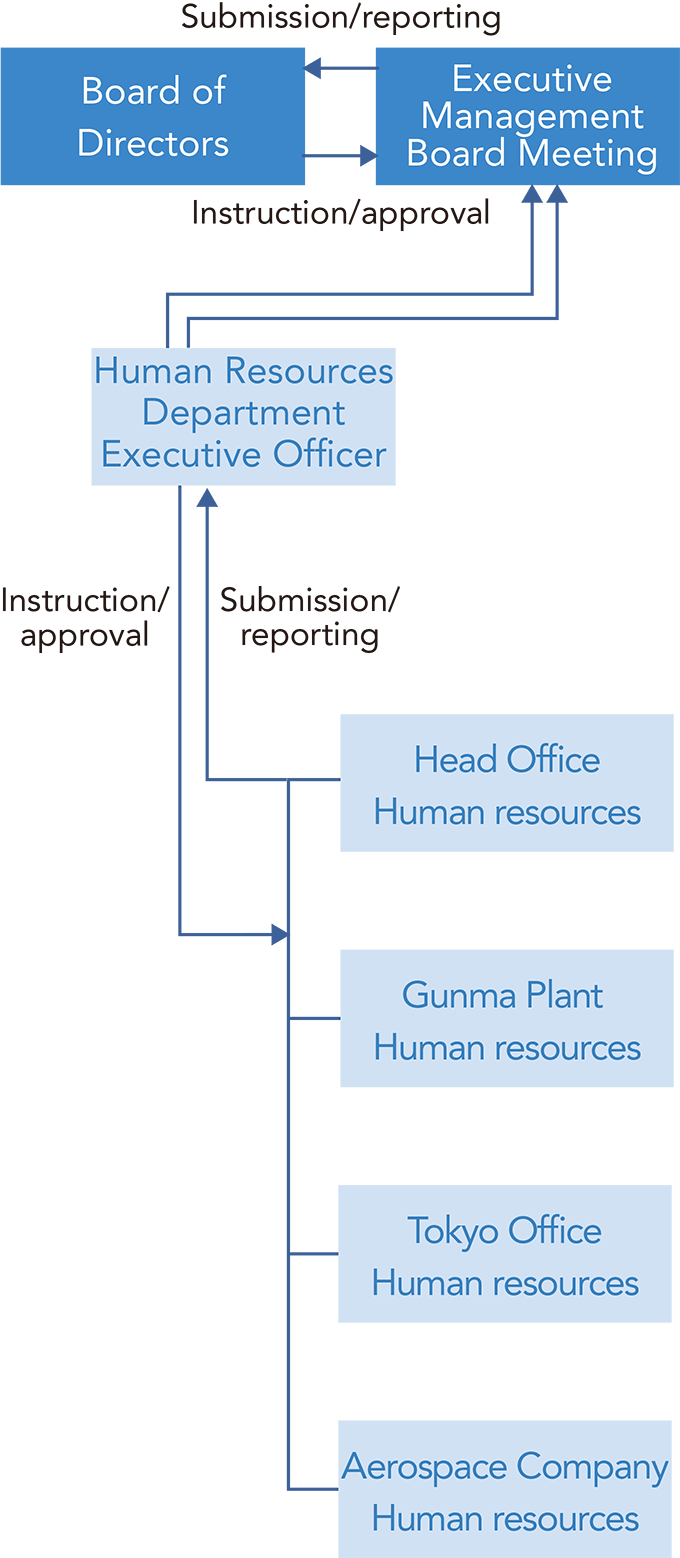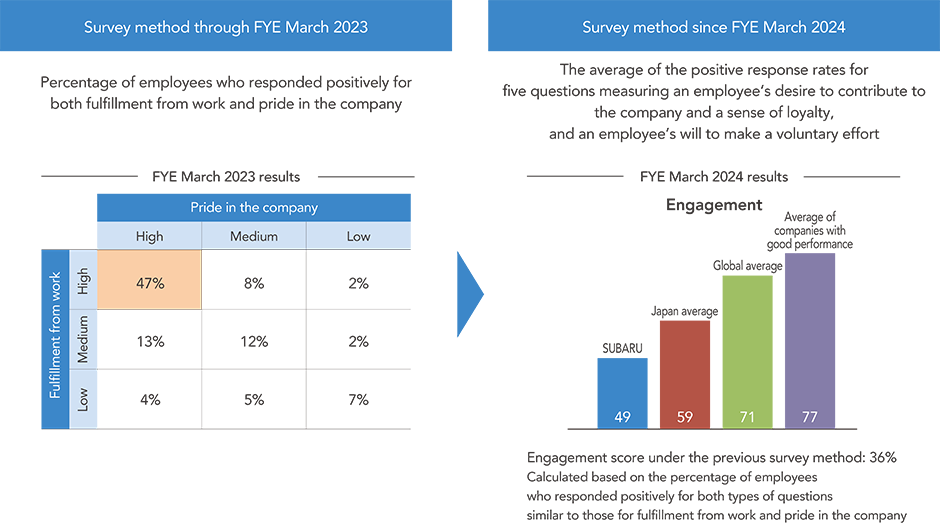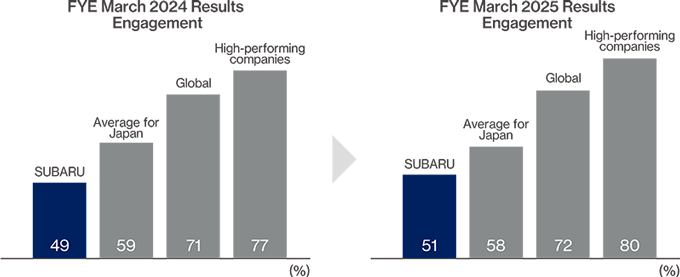Approach to Human Capital
Our Approach
Our aim is to create human resources who will provide “Enjoyment and Peace of Mind” to customers, and therefore “Delivering Happiness to All.”
In the rapidly changing business environment, the SUBARU Group is committed to human capital management with the approach that human resources are the driving force for us to enhance competitiveness and achieve sustainable growth. We have defined our vision as “toward truly competitive people and organization.” Specifically, this refers to a state where human resources demonstrate varying abilities to the maximum extent, where we are focusing on essential operations and producing results swiftly, where we operate with an awareness of total optimization and can easily act in a way going beyond organizational boundaries, and where the organization has a culture encouraging and supporting employees to take on challenges. Fulfilling this vision will enable flexible adaptation to change and achieve world-leading “Monozukuri Innovation” and “Value Creation” outlined in our New Management Policy.
To date, in pursuing our vision, we have focused on fostering individual growth—cultivating talent capable of thought and action on their own initiative—and organizational growth—helping diverse individuals to thrive—while advancing various initiatives. Furthermore, we recognize that the physical and mental well-being of our employees is at the foundation of all things, and we have been working to create workplaces that offer safety and peace of mind. Going forward, while continuing and deepening these initiatives, we will also take a further step toward strengthening connections. This is to ensure not only that diverse individuals are respected, but also that we collaborate more effectively and enable each other to further draw out our capabilities.
Risks and Opportunities
Future risks include the inability to secure human resources due to a tight labor market, intensifying competition for human resources, including from other industries, and labor problems that could lead to compliance issues, as well as turnover. Similarly, inadequate human resource development or the inability to create a workplace environment in which everyone can play an active role and in which employee diversity is respected may also affect the SUBARU Group’s business activities. On the other hand, opportunities include enhancing employee engagement and fostering innovation in business by building organizations that respect diverse individuals and enable them to maximize their capabilities.
Management System
Human Resource Strategy Promotion System
SUBARU is advancing various human capital management initiatives based on its personnel strategy aimed at realizing our vision of “toward truly competitive people and organization.” These initiatives include securing and cultivating human resources, fostering corporate culture, and creating workplaces with safety and peace of mind.
These matters are managed and advanced under the Executive Officer in charge of human resources, and are submitted for deliberation and reported to the Executive Management Board Meeting and other bodies responsible for reviewing business execution, according to their level of importance. Furthermore, important matters are individually submitted to and reported to the Board of Directors, ensuring a system where supervision by the Board is appropriately maintained.
Additionally, effective April 2025, we have newly established the position of CHRO (Chief Human Resources Officer). Under the leadership of the CHRO, we will accelerate initiatives to build the human resources and organizations capable of creating sustainable corporate competitiveness.
Targets and Metrics
SUBARU has set a target engagement score* of 70% for FYE March 2029 as an indicator for advancing human capital management. This targets achieving the global average level of engagement scores as of FYE March 2024. In the survey conducted in FYE March 2025, the engagement score was 51%.
- *
- Refers to the percentage of employees who provided positive responses to five questions assessing their motivation to contribute to the company, loyalty, and will to make voluntary effort.
Initiatives
Employee Attitudes Survey
SUBARU regards the employee engagement score as one of the key management indicators for evaluating company initiatives, and has been conducting the annual Employee Attitudes Survey since FYE March 2018 to use it as a tool for addressing organizational issues. The survey results are utilized in personnel policies and corporate culture reform efforts, as well as to identify issues and formulate countermeasures at each workplace. Since FYE March 2023, the improvement rate in the employee engagement score has been used as a qualitative (non-financial) evaluation criterion for executive compensation.
From FYE March 2024, we have adjusted the survey, modifying the calculation method for the engagement score with the aim of making it easier to analyze the survey results and compare them with other companies, and to clarify SUBARU’s strengths and challenges. These changes allow us to focus on planning countermeasures, and by adding indicators that could not be measured before, we are working to visualize the penetration of management strategies and the status of improvements in business processes across teams.
In the survey conducted in FYE March 2025, the engagement score was 51%, an improvement of two points versus the FYE March 2024 score. This is a statistically significant improvement, with scores improving across all comparable categories from the previous assessment. In particular, the positive response rate for the education and training category reached a level statistically significantly higher than the average for Japan.
However, the overall comparison to the average Japan shows that a gap remains, revealing the need for continued efforts. The survey results showed that the percentage of positive responses to questions in categories such as strategy and direction, collaborative systems, and business processes was low, and that there was a divergence from the average for Japan.
Challenges and Actions
We are addressing the results of the Employee Attitudes Survey and proceeding with issue analysis and improvement.
Strategy and Direction Category
Our analysis reveals that there is uncertainty about the feasibility of the unprecedented challenges we will tackle according to the SUBARU New Management Policy, as well as a lack of clear direction in an uncertain business environment. In response, the President and Deputy President are continuing to hold dialogue sessions to directly communicate their thoughts and ideas to employees. In FYE March 2025, we held dialogue sessions with the heads of departments who oversee each workplace to discuss the issues faced by each workplace in order to motivate putting the policies into practice. These dialogue sessions focus on having small-group discussions to engage attentively with each individual, and we are striving to use these as a way to spur the entire workplace to take on challenges with a sense of urgency.
Collaborative Systems Category
Challenges highlighted here were found in the areas of communication and collaborative systems across organizations. As overall business grows and complexity increases, the areas that need to be addressed are becoming more diverse, and with advancing specialization, we have analyzed that one contributing factor in the areas above is the lack of communication between organizations. We see these as major issues that must be overcome as we work to become “one SUBARU” in order to achieve the SUBARU New Management Policy.
Therefore, we are conducting training for approximately 4,000 leaders across the Company to encourage collaboration across organizational boundaries, thereby invigorating efforts to build collaborative systems.
Business Process Category
Challenges highlighted here were found in the areas of timeliness of decision-making and innovativeness in work processes. Amid accelerating changes in the business environment and technological advancements, we are continuing discussions on the key challenges requiring focused attention. To date, we have implemented measures including a comprehensive restructuring of business processes through significant organizational realignment, the launch of Company-wide IT training programs, and the hosting of Company-wide events to foster greater interest in and engagement with AI.
We will continue to advance initiatives toward challenge resolution from all angles, including training and corporate culture reform.
Initiatives for Further Growth
A result of our actions in various individual categories has been the gradual increase in the number of employees who think and act independently. Workplaces where people proactively engage their colleagues and take on unprecedented challenges are also growing.
On the other hand, there remains a disparity in enthusiasm between individuals and workplaces, and there are barriers remaining before small changes at the workplace level can ripple out into Company-wide reform. Further analysis of employee feedback given this situation has revealed that the root cause lies in an organizational structure that stifles the seeds of ambition.
To eliminate this stifling structure, we believe that strengthening connections is crucial. By strengthening the connections between management and the front lines, between organizations, between individuals, and between scattered challenges, we believe our destination becomes clear, ambition to take on challenges emerges Company-wide, the circle of supportive colleagues grows, and momentum spreads throughout the entire organization.
To foster such a virtuous cycle, we plan to introduce metrics to visualize and support workplace activities on a company level going forward. We will score major Company-wide activities using two axes: “employee participation rate relative to target numbers” and “perceived level of support.” As a result of more invigorated activities, scores will increase, and companies will provide ongoing support.




